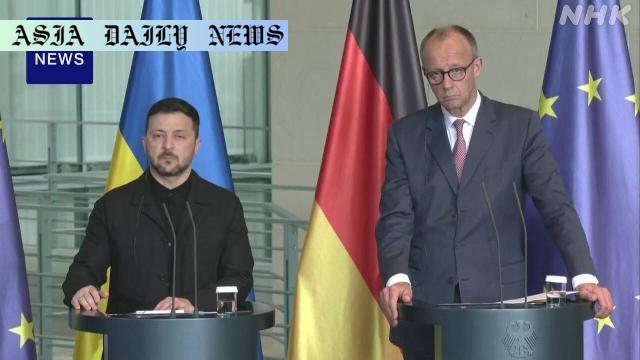Long-range weapons – Germany and Ukraine collaborate on producing advanced long-range weapons to bolster Ukraine’s defense amid tensions.
Germany and Ukraine have agreed on joint production of long-range weapons.
This agreement aims to bolster Ukraine’s defense against growing Russian aggression.
German Chancellor Merz and Ukrainian President Zelenskyy discussed strategies to counter Russia’s escalating attacks.
Russian officials criticized the pact as an obstacle to peace efforts.

Germany and Ukraine Collaborate on Long-Range Weapons Production
In a significant geopolitical development, Germany and Ukraine have entered into an agreement to jointly produce long-range weapons. This move represents a strengthened alliance between the two nations amidst the ongoing conflict in Ukraine, where Russia’s aggressive strategies have heightened tensions in the region.
Details of the Agreement
During a meeting held in Berlin on Wednesday, German Chancellor Friedrich Merz and Ukrainian President Volodymyr Zelenskyy emphasized their resolve to develop advanced weapons, bolstering Ukraine’s ability to defend itself against escalating Russian missile attacks. At a joint press conference, Merz highlighted the importance of unified efforts against Russia’s continued aggression. He also pointed out that recent airstrikes in Kyiv undermine any prospects for peace, indicating that Russia’s actions speak louder than its words.
President Zelenskyy echoed similar sentiments, reiterating that intensified pressure must be exerted on Russia to bring about stability. He also disclosed their shared commitment to exploring advanced weaponry solutions and leveraging Germany’s technical expertise to strengthen Ukraine’s military defenses.
Ramifications of the Agreement
While there was much anticipation around Germany’s potential approval to supply Taurus missiles to Ukraine, Chancellor Merz avoided making direct comments on the matter. The Taurus missile, with its impressive 500-kilometer range, remains a focal point of interest. Meanwhile, Germany has permitted Ukraine to utilize German-supplied weapons in long-range strikes against Russian territories, an indication of Berlin’s unwavering support for Kyiv.
Russia’s Reaction to the Collaboration
Predictably, the agreement has drawn strong reactions from Russia. Dmitry Peskov, the spokesperson for the Russian government, denounced the move as a provocative action that obstructs peace efforts. Despite these developments, Peskov expressed Moscow’s hope for renewed negotiations with Kyiv. He mentioned previous peace talks held in Turkey as an example of productive dialogue and urged for a second round of discussions.
The decision to jointly produce long-range weapons marks a pivotal moment in European geopolitics, with implications that extend beyond the current Russia-Ukraine conflict. It reflects Germany’s growing willingness to take a decisive stand alongside its allies, positioning itself in favor of securing Ukrainian sovereignty and stability in the region. This also signals Europe’s broader strategic goals to counteract Russian influence and aggression.
As Berlin and Kyiv move forward with their collaboration, the scope and potential impact of this strategic military agreement will continue to invite scrutiny and debate. The joint production initiative underscores the importance of alliances in times of conflict and highlights the evolving dynamics of modern warfare in an increasingly interconnected global framework.
Commentary
Germany and Ukraine’s Strategic Collaboration
The agreement between Germany and Ukraine to jointly produce long-range weapons is a clear testament to the evolving geopolitical tides in Europe. This strategic collaboration symbolizes an intensified unity among Ukraine’s Western allies. It also reflects Germany’s transition into a more assertive role in regional politics, particularly regarding military cooperation and support against aggression.
A Show of Solidarity
Germany’s move is significant not only in terms of defense collaboration but also as a powerful symbol of solidarity with Ukraine. By assisting Kyiv in developing advanced long-range weaponry, Germany is asserting its position as a key ally to Ukraine in its struggle against Russian aggression. This step demonstrates how alliances are crucial in counteracting global conflicts and securing democratic values in the face of adversity.
Implications for Regional Stability
While the agreement has drawn criticism from Russia, it could also act as a necessary deterrent against further aggression in Eastern Europe. However, Germany and its allies must tread carefully to ensure that these measures are balanced and do not inadvertently escalate tensions. It is essential to align military strategies with diplomatic efforts to ensure that pathways for peace negotiations remain open, even in the face of adversity. The recent collaboration emphasizes this delicate balancing act and highlights the complexity of addressing security concerns while pursuing long-term stability in the region.


